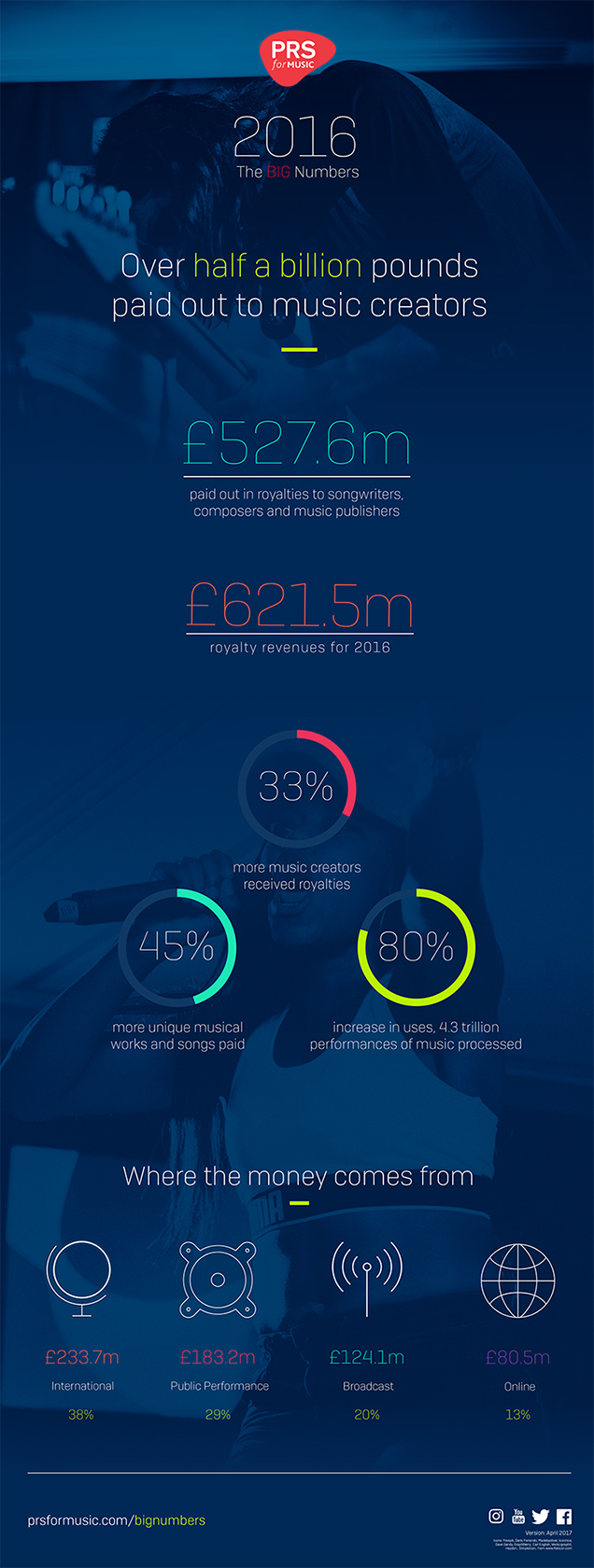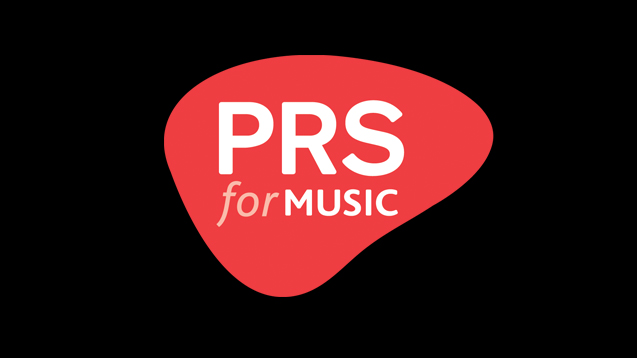The Performing Right Society (PRS) has announced it paid out more than half a billion pounds in royalties to songwriters, composers and publishers last year, in its strongest performance to date.
The organisation, which represents the rights of over 125,500 music creators in the UK and two million worldwide, paid out £527.6m to its members last year, up 11.1 percent (£52.5m) on 2015.
It was also able to deliver more money to more creators than ever before, with 33 percent more members receiving a payment compared to 2015. The number of unique musical works and songs earning money also rose by 45 percent to 4.2 million.
In turn, revenues collected by PRS increased by 10.1 percent (£57.2m) in 2016 to £621.5m.
Of the music licensing company’s four main revenue streams, international income generated from members’ music played abroad saw significant growth, with £233.7m received from equivalent societies overseas. This represents an increase of five percent (£11.2m) year-on-year.
Revenue from music played via online platforms saw the largest uplift at 89.9 percent (£38.1m) to £80.5m, while public performance income grew 4.6 percent to £183.2m and broadcast revenues were stable at £124.1m, a decrease of 0.1 percent on 2015.
In 2016, over 4.3 trillion uses of music were reported to the organisation from across the globe. This figure was just 126 billion in 2012, with growth illustrating the remarkable explosion in streaming and the success and popularity of PRS members’ repertoire internationally.
Previous investments in new technology have enabled the organisation to meet the demands of the digital era and continuing growth of the online market, it said.
Improvements in processing capabilities and the handling vast volumes of data have in turn enabled faster and more efficient payments of online royalties.
Elsewhere, collaborative ventures such as ICE, PRS’ pan-European partnership with affiliate societies GEMA (Germany) and STIM (Sweden), also helped to drive online revenue from digital platforms.
2016’s growth continues the steady upward trajectory of PRS' revenue over the last six years.
Robert Ashcroft, chief executive of PRS for Music, told M: ‘I think our ongoing success for members has been down to the systematic approach of our strategy.
‘Our first priority when I joined in 2010 was to make sure we secured what was called the “option three” environment for European competition where collecting societies competed for online mandates rather than licensees, and that has been successful. We’ve seen a growth in the revenues we get from online as a direct result of that.
‘We’ve also invested systematically in our international business. We have pursued a strategy in public performance sales of selling the value of music to companies rather than merely enforcing our rights.
‘In the broadcast world we’ve been working really closely with broadcasters to improve their reporting and accurate identification of members’ works. This has yielded a much better understanding of not only who’s music but how much music is being played to the public. That has driven our licensing rates up in that area too.
'Across the board we have been investing in the business and it has borne fruit,' he added.
The 2016 PRS financial results will be presented at the Annual General Meeting at the British Library Conference Centre on 24 May 2017.
Related news: PRS CEO on value gap, record royalties for 2016 and challenges for 2017 and beyond
The organisation, which represents the rights of over 125,500 music creators in the UK and two million worldwide, paid out £527.6m to its members last year, up 11.1 percent (£52.5m) on 2015.
It was also able to deliver more money to more creators than ever before, with 33 percent more members receiving a payment compared to 2015. The number of unique musical works and songs earning money also rose by 45 percent to 4.2 million.
In turn, revenues collected by PRS increased by 10.1 percent (£57.2m) in 2016 to £621.5m.
Of the music licensing company’s four main revenue streams, international income generated from members’ music played abroad saw significant growth, with £233.7m received from equivalent societies overseas. This represents an increase of five percent (£11.2m) year-on-year.
Revenue from music played via online platforms saw the largest uplift at 89.9 percent (£38.1m) to £80.5m, while public performance income grew 4.6 percent to £183.2m and broadcast revenues were stable at £124.1m, a decrease of 0.1 percent on 2015.
In 2016, over 4.3 trillion uses of music were reported to the organisation from across the globe. This figure was just 126 billion in 2012, with growth illustrating the remarkable explosion in streaming and the success and popularity of PRS members’ repertoire internationally.
Previous investments in new technology have enabled the organisation to meet the demands of the digital era and continuing growth of the online market, it said.
Improvements in processing capabilities and the handling vast volumes of data have in turn enabled faster and more efficient payments of online royalties.
Elsewhere, collaborative ventures such as ICE, PRS’ pan-European partnership with affiliate societies GEMA (Germany) and STIM (Sweden), also helped to drive online revenue from digital platforms.
2016’s growth continues the steady upward trajectory of PRS' revenue over the last six years.
Robert Ashcroft, chief executive of PRS for Music, told M: ‘I think our ongoing success for members has been down to the systematic approach of our strategy.
‘Our first priority when I joined in 2010 was to make sure we secured what was called the “option three” environment for European competition where collecting societies competed for online mandates rather than licensees, and that has been successful. We’ve seen a growth in the revenues we get from online as a direct result of that.
‘We’ve also invested systematically in our international business. We have pursued a strategy in public performance sales of selling the value of music to companies rather than merely enforcing our rights.
‘In the broadcast world we’ve been working really closely with broadcasters to improve their reporting and accurate identification of members’ works. This has yielded a much better understanding of not only who’s music but how much music is being played to the public. That has driven our licensing rates up in that area too.
'Across the board we have been investing in the business and it has borne fruit,' he added.
The 2016 PRS financial results will be presented at the Annual General Meeting at the British Library Conference Centre on 24 May 2017.
Related news: PRS CEO on value gap, record royalties for 2016 and challenges for 2017 and beyond



